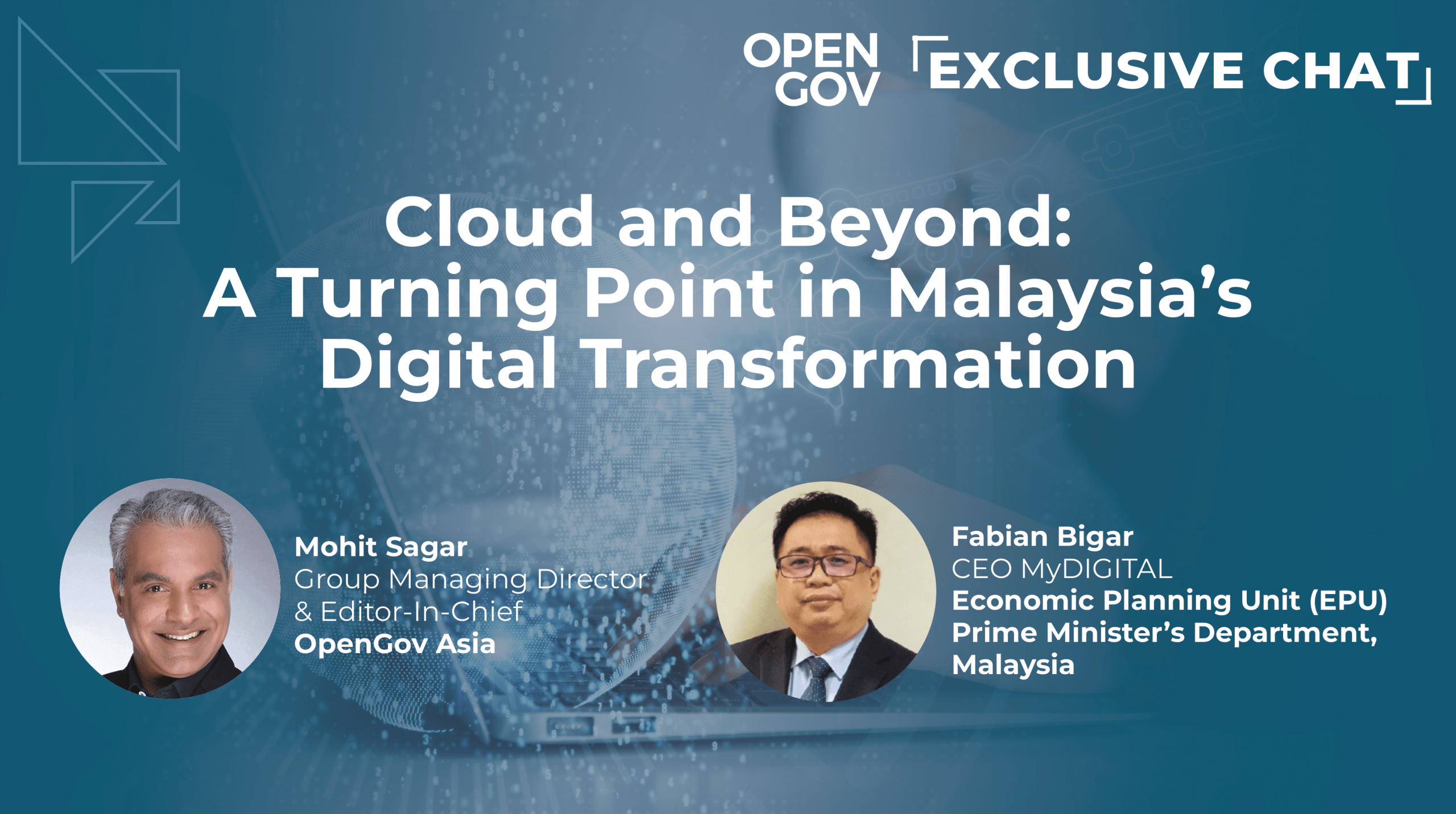
The pandemic has turned the traditional businesses in Malaysia into digital ones and forced them to move online, resulting in the digital economy growing rapidly in 2020.
To give a carefully considered vision and shape to this growth, the government created Malaysia’s Digital Economy Blueprint (MyDIGITAL) which lays the groundwork for the country’s transformation toward an advanced digital economy. It is designed to pave the way for the country to strategically position itself as a competitive force in this new era for the region and globally.
 Fabian Bigar is the Chief Executive Officer for the Strategic Change Management Office (SCMO), now formally known as MyDIGITAL Corporation since April 2021. He drives national change management and ensures the successful delivery of MyDIGITAL. Previously he was the Undersecretary for Policy and International Relations in the Ministry of Health, Director of the Civil Service Delivery Unit in the Prime Minister’s Department and the Director for the National Key Economic Area – Healthcare as well as the Director for National Key Results Area – Low-Income Households in the Performance Management and Delivery Unit (PEMANDU) under the Prime Minister’s Department.
Fabian Bigar is the Chief Executive Officer for the Strategic Change Management Office (SCMO), now formally known as MyDIGITAL Corporation since April 2021. He drives national change management and ensures the successful delivery of MyDIGITAL. Previously he was the Undersecretary for Policy and International Relations in the Ministry of Health, Director of the Civil Service Delivery Unit in the Prime Minister’s Department and the Director for the National Key Economic Area – Healthcare as well as the Director for National Key Results Area – Low-Income Households in the Performance Management and Delivery Unit (PEMANDU) under the Prime Minister’s Department.
In an exclusive interview with Mohit Sagar, Group Managing Director and Editor-in-Chief, OpenGov Asia, Fabian Bigar shared in-depth insights into what the Malaysian government intends to do to speed up and prepare local businesses and society to navigate the rapidly evolving digital and technological landscape.
Digital Ambitions of Malaysia
Malaysia intends to be a regional leader in the digital economy and achieve inclusive, responsible and sustainable socio-economic development.
MyDIGITAL encapsulates the government’s ambitions to transform Malaysia into a digitally-enabled and technology-enabled, high-income country. The Blueprint is designed to articulate the vision, set the direction, lay out the strategy and establish milestones to build the foundation of the growth of the digital economy.
Its three goals are to inspire industry players to become innovators, users and adopters of new business models; to harness human capital to prosper in the digital economy, and to cultivate an integrated ecosystem that allows society to embrace the digital economy.
It has six strategic thrusts that have been identified that are supported by 48 national initiatives, 28 sectoral initiatives and 22 strategies. These are driving digital transformation in the public sector; boosting economic competitiveness through digitalisation; building enabling digital infrastructure; building agile and competent digital talent; creating an inclusive digital society; create a digital ecosystem that is trusted, safe, and ethical.
One of the main functions of MyDigital is to make sure to speed up some of the changes that Malaysia wants for its economy. Part of this is increasing private-public partnerships and collaboration and to be fearless in introducing new innovative ways to nudge certain things to happen, such as introducing the concept of catalytic projects, which is likely to be a game-changer to fast-track some of the initiatives under the Malaysia Digital Economy Blueprint.
“We need to learn from others. From the experiences of other countries, international bodies like World Bank and World Economic Forum and I think we need to be open about what our shortcomings are, and how we improve ourselves and collaborate with these people,” Bigar readily acknowledges.
Implementing MyDIGITAL
The implementation is divided into three phases. Phase 1 began in 2021, will continue in 2022 and aims to strengthen the foundation for digital adaptation. Phase 2 will drive inclusive digital transformation from 2023 to 2025. Phase 3 will position Malaysia as a regional leader in digital content and cyber security from 2026 to 2030.
Of course, during and at the end of each one, the team will monitor and review progress to implement tweaks, changes or revamps. And at all times, the agency is open to collaboration.
“We want to increase digital literacy in Malaysia by working with several organisations to fill in the gaps that we’ve discovered,” says Fabian. “It is vital to quickly identify gaps and figure out how to obtain needed assistance available from both the private and public sectors.”
The Malaysia Cyber Security Strategy has clear plans to make the country more resilient to cyber-attacks. Regulatory policy demands that regulations be reviewed as needed to get rid of old ones that could slow the growth of digitalisation and compromise safety.
Addressing key challenges in digital adaptation
MyDIGITAL recognises the importance of growing the digital economy. They have various programmes such as leadership programmes and are collaborating with various entities to produce joint publications and webinars that will better engage more people and raise awareness about the digital economy.
According to Bigar, genuine and widespread digital adaptation in Malaysia will start by creating awareness. This can be followed by accelerating the adoption and use of these technologies and showing some successful cases where organisations have successfully contributed to the growth of the digital economy.
The outfit is looking for contributions from MSMEs to drive social change and income generation. To facilitate their mainstreaming, the government must help MSMEs in their digitalisation journey to e-commerce.
MyDIGITAL itself has several initiatives and programmes to support the digitalisation of MSMEs. It organises sessions where the agencies involved in the digital economy of Malaysia – federal or state – are invited to learn more, get upskilled and then roll out initiatives for MSMEs.
Simultaneously, the Malaysian government is eager to improve digital literacy and adoption among the small-medium players. They are exploring online financial initiatives, working with the Central Bank to introduce cashless transactions at all levels, including QR codes, wallets and similar options.
A defining moment with “Cloud-First”
Cloud usage is an integral part of the Blueprint and the Digital-First programme aims to ensure the federal and state usage of cloud services. This programme focuses on two main areas: reducing the use of physical storage files by switching to a “cloud-first” strategy and adopting a “paperless culture” at work by finding and using the right technologies to make paperless workflows and transactions possible.
This is expected to make better use of government resources and automate tasks by setting up digital workflows. It will also improve access to data and information by centralising data storage in the cloud and make it easier for civil servants to work remotely.
By 2022 ends, MyDIGITAL is targeting 80% usage of cloud storage across the government in addition to incorporating cloud computing for businesses to procure services without having to own and maintain assets.
Bigar elaborated on the plan to give all businesses a “Digital Compass” – a customised technology roadmap for different industries and businesses with different levels of digital maturity. The Compass will give businesses a step-by-step guide to the digital solutions they can use at different stages of their growth. As part of this initiative, there will also be a programme to raise awareness about the benefits of Intellectual Property (IP) registration to help and encourage businesses to do so.
Bigar believes that cloud should be introduced to smaller businesses as well to allow them to embrace new technology. If one looks at digital literacy across the spectrum of the population, a lot of work has been done for education or those who are in the workforce. This is primarily because of a top-down approach for schools and educational institutes or, in the case of employees, perhaps because they are more intrinsically motivated. MyDIGITAL wants the understanding and uptake of technology to be more widespread – across demographics and geographies – by creating programmes for ordinary citizens.
Bigar wants to bring awareness at the working level in every industry; to educate people on the digital economy and available technology. He firmly believes that government leaders and politicians should better understand what digitalisation is all about by also establishing specific programmes for them.
“We are facing this transition in the digital economy; we must collaborate and take the necessary steps to adopt the new standard and work together. The journey won’t be easy, but we need to be brave enough to take this huge step forward to improve the quality of life for all Malaysians,” Bigar ends optimistically.
















